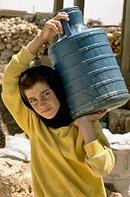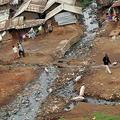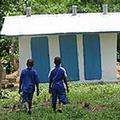 2008年「世界水資源日」適逢「國際環境衛生年」,聯合國秘書長潘基文22日致詞時表示,未來仍將有許多人口無法擁有基本衛生與新鮮飲水,而缺乏政治意願乃是罪魁禍首。潘基文呼籲國際社會應採取更堅定、迅速的行動解決水資源問題。他並強調為乾淨用水所做的點滴努力,亦會為社會其他方面帶來正面的收穫。
2008年「世界水資源日」適逢「國際環境衛生年」,聯合國秘書長潘基文22日致詞時表示,未來仍將有許多人口無法擁有基本衛生與新鮮飲水,而缺乏政治意願乃是罪魁禍首。潘基文呼籲國際社會應採取更堅定、迅速的行動解決水資源問題。他並強調為乾淨用水所做的點滴努力,亦會為社會其他方面帶來正面的收穫。
潘基文表示,「在用水與衛生設施上每投資1元,就等同於7元的經濟收益,連帶還有減輕貧窮、增進健康與提高生活水平等無價的珍貴效應。」
全世界有超過3分之1的人口,即約26億人正處於惡劣的衛生環境,平均每20秒就有一名孩童因此死亡,然而這些情況都是可以事先預防的。潘基文認為,這是一種「不公義」的現象。
他沈痛地指出,「不清潔的環境,加上缺乏安全飲水與適當衛生設備,奪走全球無以數計的生命。倖存的人也很難擁有健康、富足的生活。孩童,特別是女孩,往往被剝奪就學的機會,大人則因為衛生相關疾病而無力從事生產工作。」
2008年世界水資源日的主題是「衛生至上(Sanitation Matters)」,根據聯合國世界衛生組織與兒童基金會的共同調查,超過60%的非洲居民缺乏恰當的廁所設施。
世界衛生組織總幹事陳馮富珍(Margaret Chan)指出,「衛生是大眾健康的基礎,改善衛生條件能大幅提昇人民,特別是女性的健康與福祉。」目前有26億人家中沒有廁所,其中的10億人是孩童。
 聯合國「水供給及淨化合作委員會」(WSSCC)於14日成立了全球衛生基金,首次為日益增加的清潔衛生需求提供世界性的資金援助。
聯合國「水供給及淨化合作委員會」(WSSCC)於14日成立了全球衛生基金,首次為日益增加的清潔衛生需求提供世界性的資金援助。
WSSCC總幹事連恩(Jon Lane)強調,該基金是以需求為導向且以人為本,「全球衛生基金不是著眼於建造多少下水道管線,或其他大型工程,因為由上而下的投資,是無法真正地濟助窮苦的民眾。本基金會用來支持的是,在地社群透過決策過程所建立的計畫,致力於衛生相關教育、提昇意識,以及增加衛生需求等方面。」
聯合國環境規劃署(UNEP)執行主任史坦納(Achim Steiner)舉出肯亞沿海都市曼巴沙(Mombasa)為例,該城的西莫拉特瓦(Shimo la Tewa)監獄採用廉價的方式解決衛生問題,還帶來其他好處。透過囚犯勞務的方式,監獄的廢水先經自然濕地過濾,成為所謂的「黑水(black wastewater)」,再提供灌溉及魚塘使用,以生產自行食用或對外販售的糧食。
 此外,含有大量人類排泄物的廢水也用來生產沼氣,供應廚房燃料、暖氣與照明,幫收容4千名囚犯的監獄節省開銷與排放。史坦納表示,曼巴沙市這項系統還可以幫助鳥類與海洋生物,而且平均每人只花費25美元,遠低於先進國家的成本。
此外,含有大量人類排泄物的廢水也用來生產沼氣,供應廚房燃料、暖氣與照明,幫收容4千名囚犯的監獄節省開銷與排放。史坦納表示,曼巴沙市這項系統還可以幫助鳥類與海洋生物,而且平均每人只花費25美元,遠低於先進國家的成本。
他說,「希望能將他們的經驗應用在世界其他角落,從自然環境為主的角度,看待部份衛生與污染的複雜問題。」
A lack of political will remains the greatest obstacle to efforts to reduce the number of people without access to basic sanitation and clean, running water, UN Secretary-General Ban Ki-moon said Saturday in a message to mark World Water Day. This year, World Water Day coincides with the International Year of Sanitation.
Ban called on the international community to take firmer and faster steps to tackle the problem and said the flow of positive results would extend far beyond better access to clean water.
"Every dollar invested in water and sanitation yields an estimate seven dollars worth of productive activity," said Ban. "And that comes on top of the immeasurable gains in cutting poverty, improving health and raising living standards."
The secretary-general called it "unconscionable" that a child dies on average every 20 seconds because of sub-standard sanitation conditions that are preventable - a situation endured by an estimated 2.6 billion people worldwide, or more than a third of the global population.
"Poor sanitation combines with a lack of safe drinking water and inadequate hygiene to contribute to the terrible global death toll," Ban mourned. "Those who survive face diminished chances of living a healthy and productive existence. Children, especially girls, are forced to stay out of school, while hygiene-related diseases keep adults from engaging in productive work."
Over 60 percent of Africans lack access to a proper toilet, according to the United Nations World Health Organization and UN Children's Fund in a joint message for World Water Day, whose 2008 theme is Sanitation Matters.
"Sanitation is a cornerstone of public health," said Margaret Chan, WHO Director-General. "Improved sanitation contributes enormously to human health and wellbeing, especially for girls and women."
Of the 2.6 billion people without toilets in their homes, nearly 1 billion of them are children.
On March 14, the WSSCC launched the Global Sanitation Fund, the first global financing mechanism to increase expenditure on sanitation and hygiene.
WSSCC Executive Director Jon Lane stresses that the Global Sanitation Fund is demand driven and people centered. "The Global Sanitation Fund will not embark on the construction of kilometers of sewerage pipes and other huge construction projects, since top-down investments in the sanitation sector don't reach the poorest people," said Lane. "The Global Sanitation Fund will support programs that have been developed through decision-making processes involving local communities and will concentrate on hygiene education, raising awareness and creating demand."
But as projects such as one at the Shimo la Tewa jail in Mombasa, a city on the Kenyan coast, highlight that there are less costly solutions to the problem that are beneficial for other reasons, said Achim Steiner, executive director of the UN Environment Programme. In this project, inmates work with nature to neutralize human wastes by using wetland-filtered water, called "black wastewater," for irrigation and fish farming, providing a source of protein which can be consumed or sold to local markets.
Additionally, this wastewater – containing high concentrations of human waste – will also be used to produced biogas, which can be serve as fuel for cooking, heating and lighting. This could slash the costs of the 4,000 person prison and curb emissions.
The scheme in Mombasa, which is also expected to help wildlife such as birds and marine organisms, has a price tag of $25 per person served, which is significantly less than projects in developed countries, Steiner said. “It is hoped that the lessons learn can be applied to other parts of the world so that the multiple challenges of sanitation and pollution can, in part, be viewed through a nature-based lens.”
全文及圖片詳見:ENS





